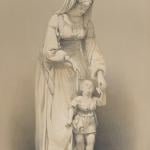
In Matthew 25, Jesus continues to teach how to be ready for His return. What does it mean to be ready?
Scripture:
2 Samuel, chapters 15-16; Psalm 32; Matthew, chapter 25
Matthew 25:1-13 (NASB):
“Then the kingdom of heaven will be comparable to ten virgins, who took their lamps and went out to meet the groom. Five of them were foolish, and five were prudent. For when the foolish took their lamps, they did not take extra oil with them; but the prudent ones took oil in flasks with their lamps.
Now while the groom was delaying, they all became drowsy and began to sleep. But at midnight there finally was a shout: ‘Behold, the groom! Come out and meet him.’ Then all those virgins got up and trimmed their lamps. But the foolish virgins said to the prudent ones, ‘Give us some of your oil, because our lamps are going out.’ However, the prudent ones answered, ‘No, there most certainly would not be enough for us and you too; go instead to the merchants and buy some for yourselves.’
But while they were on their way to buy the oil, the groom came, and those who were ready went in with him to the wedding feats; and the door was shut. Yet later, the other virgins also came, saying, ‘Lord, Lord, open up for us.’ But he answered, ‘Truly I say to you, I do not know you.’ Be on the alert then, because you do not know the day nor the hour.”
Observations: What Does It Mean to Be Ready?
The Parable of the Virgins
Yesterday, I reflected on Jesus’ challenge to His disciples to be ready for His return (“Be Ready for Christ’s Return”). My key focus was on doing Christ’s will; that’s how we prepare for His return. Today’s passage continues that thought, with some specific direction on being ready. Chapter 25 contains three parts: the parable of ten virgins (verses 1-13); the parable of the talents (verses 14-30); and Christ’s description of the final judgment (verses 31-46). While each of these passages are often studied on their own, we cannot lose sight of the overall context. Jesus is teaching His disciples about His return, and what it means for them to be ready.
I see three main points in the parable of the virgins. First, they all wanted to be ready, but they did not all do what was necessary. They all had their lamps, but only the five prudent virgins took extra oil. The foolish ones were prepared for the moment; the prudent ones strove to be ready no matter how long it would be. Second, the prudent virgins could not give oil to the foolish ones. Each person had to make their own preparations. Finally, even though the foolish virgins wanted to be ready and tried to get oil, they were too late. Once the groom and come and the door was shut, they could not get in. Jesus closes this parable by saying, “Be on the alert then, because you do not know the day nor the hour.”
The Parable of the Talents
The other two passages amplify Jesus’ warning to be ready. In the parable of the talents, the servants were not judged in comparison with each other. Instead, the master judged them based on what they did with the talents they had. Both of the faithful servants received the same commendation: “Well done, good and faithful slave. You were faithful in a few things, I will put you in charge of many things; enter the joy of your master” (Matthew 25:21-22). On the other hand, the “worthless, lazy” slave did not use the talent he was given. He simply buried it in the ground to “protect” it.
That servant was cast out “into the outer darkness; in that place there will be weeping and gnashing of teeth” (Matthew 25:30). This second parable thus expands Jesus’ teaching by pointing out that being “cast out” is not simply a loss of blessing; it involves consequences. Jesus mentioned “weeping and gnashing of teeth” at the end of Matthew 24 (Matthew 24:51). In that passage, the servant who was “cast out” had acted badly: he beat his fellow servants and began to eat and drink with drunks. In the parable of the talents the servant simply failed to use the talent. However, his fate was the same; he was cast out into the outer darkness.
The Final Judgment
The last part of chapter 25 (Matthew 25:31-46) is different. Jesus does not indicate that this is a parable. The first two passages clearly are; Jesus indicates that the kingdom of heaven will be comparable to… (verse 1) or “like” the story he proceeds to tell. In the last passage, He says, “When the Son of Man comes in His glory…” This is prophecy, not parable. So what does Jesus tell us about being ready?
First, He indicates that there will be a judgment in which “all the nations will be gathered before Him; and He will separate them from one another” (verse 32). No exceptions or exclusions. This is not a separation of “nations,” but of individual people. Second, the basis for the division is how people responded to the King. The first group, called “blessed of My Father,” responded with love; the second group did not.
Next, notice that no one disputed the standard. “I was hungry, and you gave Me something to eat; I was thirsty, and you gave Me something to drink…” Certainly, anyone would feed the King! Anyone would give Him something to drink! The first group did what was expected; the second did not. But neither group understood how they had done so. “When did we see You…?” Jesus responds: “To the extent that you did if for one of the least of these brothers and sisters of Mine, you did it for Me” (verse 40) – or didn’t do it for Him (verse 45). The lesson is clear: how we treat others is a reflection of our devotion to Jesus.
Application: What Does It Mean to Be Ready?
Chapter 25 concludes Matthew’s account of Jesus’ answer to His disciples’ question about His return. In chapter 24, Jesus warns them to be ready; in chapter 25, He gives specific direction on how to be ready. The three sections in chapter 25 have specific applications. First, be ready, because once He returns it will be too late to prepare. Second, be ready by being faithful in using what the Master has entrusted to you. The servant with two talents did not have to earn five, as the first servant did. Each was judged according to what they did with what they were given.
Finally, the last passage takes us back to the distinction between the letter of the law and the spirit of the law (see “The Letter of the Law and the Spirit of the Law”). All of those who stand before the King will know how they should have responded to Him. “Of course we would have fed You if we had seen You hungry, Jesus!” That’s the letter of the law. But the spirit of the law calls for more: “To the extent You did it, or did not do it, for the least of these, you did it for Me.”
I believe that God is reminding us that following Jesus is much more than obeying a checklist. Jesus calls us to “follow” Him – to pattern our lives after His. That’s the standard. “Being ready” means striving each day to embody His example!
Prayer:
Father, we confess that it is hard for us to be like Jesus. Thank You for reminding us that You understand that. You made us, and You know us. But You have also given us Your Holy Spirit to both lead us in Your way and empower us to obey. You are forming us each day in the image of Jesus. Remind us that each decision, each act and attitude, is an opportunity for obedience and growth. Help us today to hear and obey, that we may become more like Jesus. Amen.













